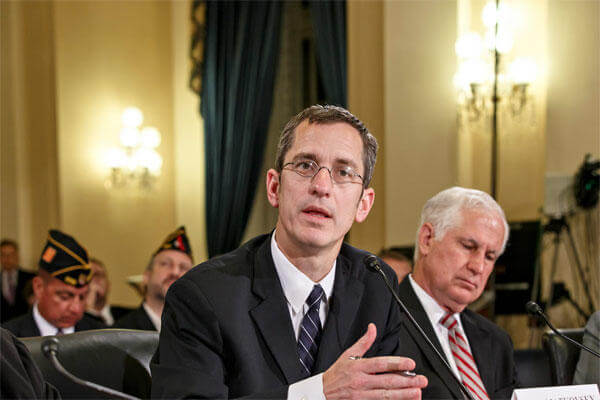Department of Veterans Affairs employees linked to manipulation of patient appointments will have to be charged criminally before the rest of the workforce takes the situation seriously, the VA's acting inspector general told Congress late Monday night.
"Once someone loses their job or gets criminally charged for doing this, it will no longer be a game," Richard J. Griffin, the acting VA IG, told the House Veterans Affairs Committee Monday during a late-night hearing.
Some lawmakers have been calling for a criminal investigation since allegations first emerged that up to 40 veterans awaiting medical appointments with the VA Medical Center in Phoenix, Arizona, died before they saw a doctor.
The top three officials at the Phoenix facility are being fired. However, lawmakers said they want to see more VA executives disciplined to include jail time if data manipulation can be tied to any harm to a veteran.
Acting VA Secretary Sloan Gibson has confirmed that 18 veterans on the so-called secret Phoenix waiting list died.
Griffin said his office is currently conducting investigations at 69 facilities in connection to what is now recognized as a systemic problem with staff cooking the books on appointments.
Based on what he has garnered from investigators so far, Griffin said a major problem is that VA standards are not consistent and there is a lack of accountability.
"You reap what you sow," he said. "You send something [a directive] out there and if there's no ownership the results are predictable ... I think [the problem is] leadership in the field and leadership in headquarters."
During the late night hearing Philip Matkovsky, a VA assistant deputy under secretary for health for administrative operations, told the panel that the key to restoring credibility to the VA is "getting back to basics."
"Delivering good health care in a timely manner," he said. Matkovsky detailed a number of steps the VA has begun taking to improve its scheduling system and make it more transparent.
Lawmakers did not ask about the specifics of the plan, which the VA announced on Monday afternoon. The same audit findings the VA released on Monday also revealed that 57,000 veterans were found to have waited 90 days or more for their first VA medical appointments, and another 63,000 over the past 10 years never got an appointment after enrolling.
In separate testimony Debra Draper, director for health care at the General Accountability Office, said the GAO found one instance in which a veteran experienced delays in care and died before getting the surgery that could have saved him.
The veteran was not named in testimony, nor was the VA medical center where he was enrolled.
Draper said the veteran was diagnosed with two aneurisms in September 2013. The VA hospital scheduled him for surgery the next month, but then cancelled the operation because of staffing problems. After being approved for surgery at a non-VA hospital in early December, that operation also was scrubbed when that hospital lost the veteran's paperwork.
The VA resubmitted the patient's information and the surgery was slated for Feb. 14, 2014. But the veteran died the day before, GAO found. A coroner's report concluded the veteran died from heart disease and hypertension, with the aneurysms still intact at the time of death.
Both the IG and the GAO has reported for years that VA facilities were not accurately reporting patient wait times and that the processes for doing so were not reliable. Griffin said the IG's office has turned out 18 reports on the issue since 2005.
Added to a weak and flawed reporting system was the financial incentive to report positive results, past reviews said. Meeting the VA's performance standards on patient wait times was a factor in whether executives earned thousands of dollars in annual bonuses.
The VA has already eliminated wait time as a factor in bonuses, and has also ordered that no Senior Executive Service officer across the VA health care system will receive a bonus for 2014.
"When sufficient credible evidence is identified supporting a potential violation of criminal and or civil law, we have contacted and are coordinating our efforts with the Department of Justice," Griffin said.
The inspector general said his office investigators have found instances of supervisors directing staff to manipulate patient appointments, but the Justice Department will have to make the determination if the actions are criminal.
"You start with the GS-5 or GS-6 schedulers, and there are many layers above them before you get to the top of the facility -- and you have to work your way back to see who put [the instructions] out," he said. "I suspect that if people do start getting charged that mid-level person is going to say ‘I'm not going to take the fall.'"
Rep. Jeff Miller, R-Fla., chairman of the panel, said his committee had written the Justice Department asking that a criminal investigation be opened into the wait times. He has heard nothing back so far, he said.
During testimony shortly before he resigned at the end of May, former VA Secretary Eric Shinseki said he would recommend criminal charges and seek a Justice Department case if the IG believed the evidence warranted it.
President Obama is also on the record backing prosecution of employees if there was criminal activity.
"We have an excellent criminal investigation staff and they're pursuing all leads at this time," Griffin told lawmakers.
-- Bryant Jordan can be reached at bryant.jordan@monster.com.





























